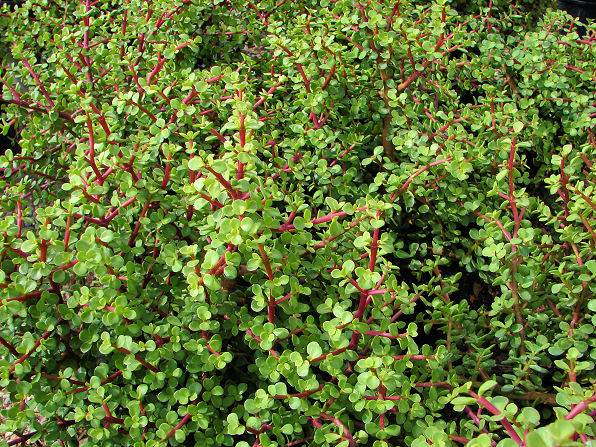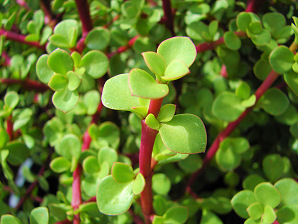Xeriscape Landscape Plants & Flowers
For The Arizona Desert Environment.
Pictures, Photos, Images, Descriptions, & Reviews.
Elephant's Food, Portulacaria afra.
We Are Proud Of Our SafeSurf Rating!
Click On Any Of The Following Links By Amazon.Com
For Books, & Videos About Wildflowers Of Arizona & The Southwest USA. No Obligation!
 |
| Elephant's Food. Portulacaria afra. Glendale, Arizona, March 6, 2006. |
|---|
 | |
| Elephant's Food. Portulacaria afra. | Elephant's Food. Portulacaria afra. |
|---|
Elephant's Food.
We wish to thank Wikipedia, the free encyclopedia for some of the information on this page. We share images and information with Wikipedia. Portulacaria afra, is a small-leaved succulent plant found in South Africa. It is common in the east of South Africa. It is also found in the karoo of the Western Cape. Spekboom is found most prolifically within a specific habitat known as Thicket, which locally is often called noorsveld, after the high number of succulent Euphorbia species, which is often called noors plants. It is a soft-wooded, semi-evergreen upright shrub or small tree, usually 8 � 15 feet tall. It is similar in appearance to the "jade plant" Crassula ovata (family Crassulaceae). It is a small tree or succulent shrub. Used for bonsai. The plants can be grown in full sun in Phoenix or Tucson.. It is an ideal xeriscape plant. It also can be grown in semi-shade in dry areas or even in well-watered flowerbeds. It tolerates a moderate degree of frost, especially when mature.
Quick Notes:
Height: Up to 12 feet tall. Most are about 3 - 4 feet.
Flowers: Its flowers are pink, small, star shaped; sepals 2; petals 5, pale pink to purplish; stamens 5 to 7. They rarely bloom.
Flowering Time: Phoenix Arizona, Mid March - April.
Fruit & Seeds: The fruits, commonly known as non edible dates, are on the terminal portion of trunk, in clusters of small, 1 inch round to oval reddish brown fruit.
Stems/Trunks: White thorns of varying length; typically 1/4 to 1in long and white; thorns are most obvious on young trees, fewer found on mature specimens; young stem growth has reddish color, turning brown to gray-brown and becoming furrowed and scaly.
Leaves: The leaves simple, opposite, almost circular, about 7/16 inch in diameter, or obovate, up to 1 1/4 inch in diameter, fleshy, pale grey, pale greyblue-green to dark green; each pair of leaves are at right angles to the next along the reddish stems; the apex is rounded with a short, abrupt point; the base is tapering; margin entire; petiole very short or almost absent.
Found: Native of South Africa.
Hardiness:
Soil pH requirements:
Sun Exposure:
Elevation: 0 - 2,400 Feet. In Arizona.
Habitat: Lower elevations where water is available. It grows well in sand, sandy loam. It needs good drainage and aeration. It is remarkably tolerant of alkali.
Miscellaneous: Maintenance: Low. Photos Taken; Glendale, Arizona. March 6, 2006.
|
We Are Proud Of Our SafeSurf Rating!
Click On Any Of The Following Links By Amazon.Com
For Books, & Videos About Wildflowers Of Arizona & The Southwest USA. No Obligation!
| © 1966 - Present, Audrey, Eve, & George DeLange |
